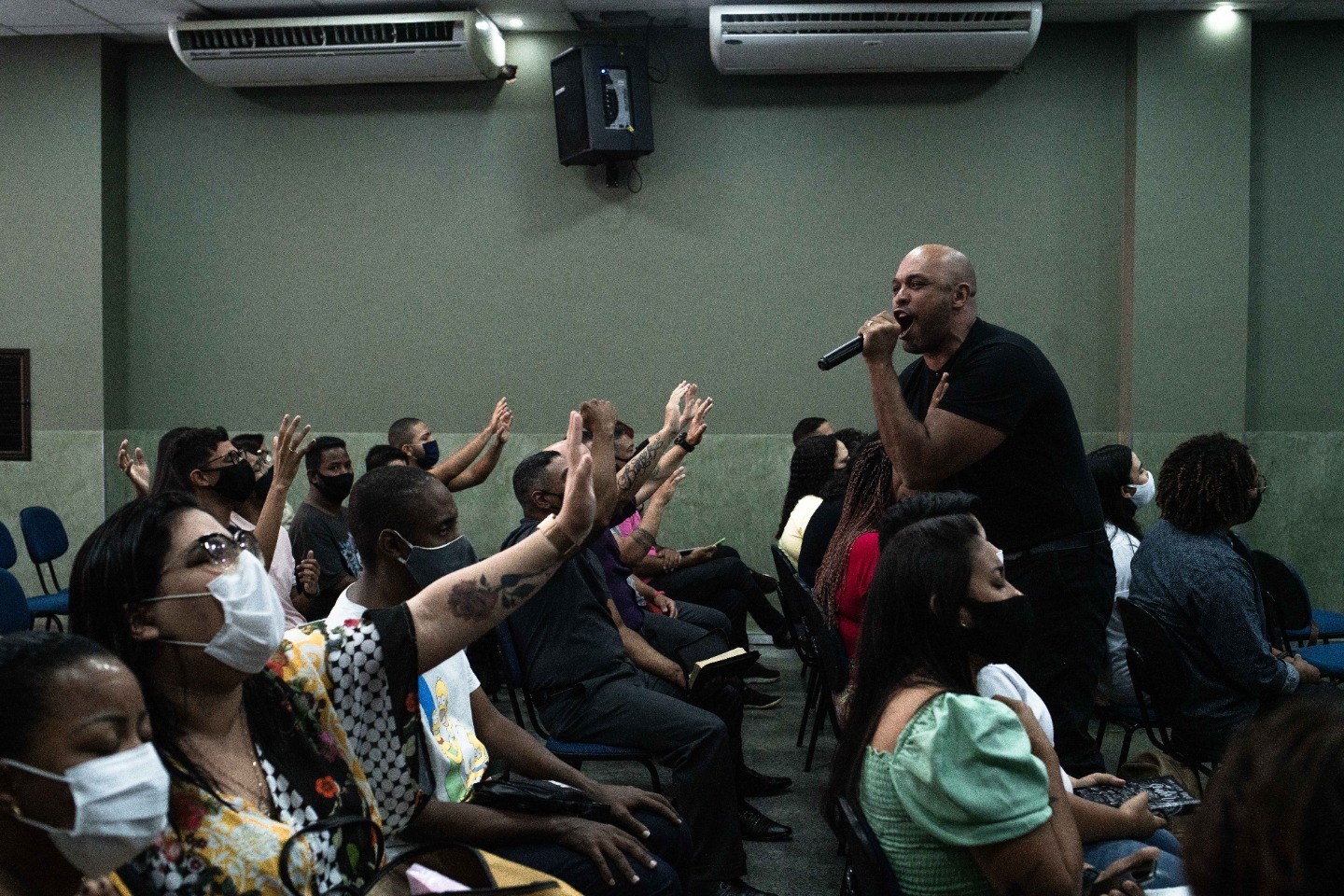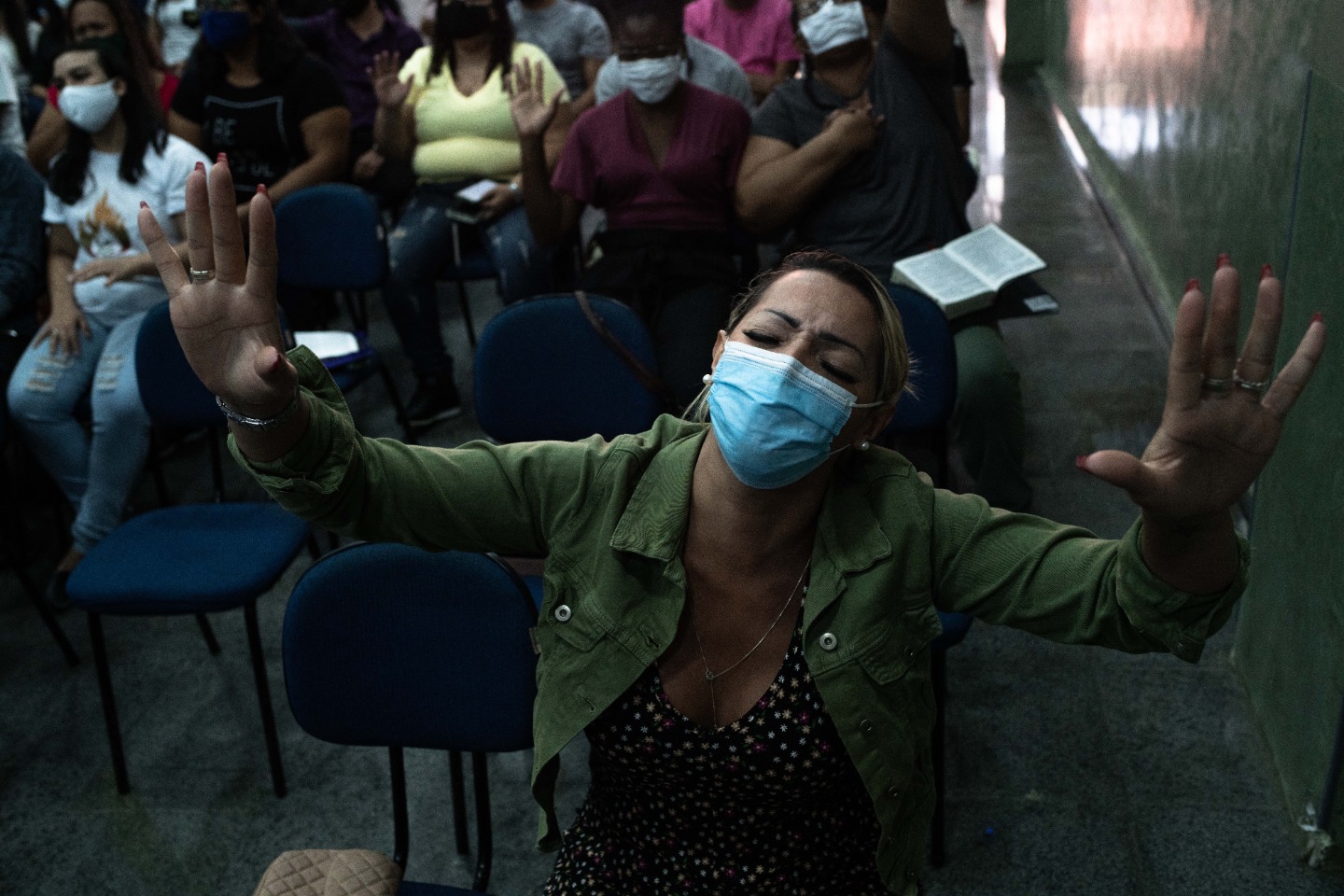RIO DE JANEIRO, Brazil – “Smile. Jesus Accepts You” says the entrance sign at the church in a working-class neighborhood of Rio de Janeiro. It’s the first clue that there’s something different in this place of worship.
“We may not have biological families, but our families are built upon love,” said a woman preacher at a recent Sunday service. “That’s what makes us special.”
Videos by VICE
The majority of the worshippers are gay couples — both men and women — who have found their way to a church that both welcomes their evangelical faith and accepts their gender and sexual identities.
“Most of our members have always been Christians, but, as sexual and gender minorities, they felt compelled to abandon their churches and their faith,” said Pastor Marcos Gladstone. He founded the Contemporary Christian Church (or ICC) 15 years ago to embrace the LGBTQ+ Christians who have always faced discrimination from conventional evangelical churches.
When he founded ICC, Gladstone thought it might attract a dozen people. Today, the denomination has spread to 11 churches across four Brazilian states (São Paulo, Bahia, Minas Gerais, and Rio de Janeiro) and has 1,800 regular members.
That growth, Gladstone said, is a consequence of rising homophobia in Brazil.

“The more Brazil oppresses minorities, the more the oppressed people will look for ways to be welcomed and loved,” he said. “We have to open more churches because the LGBTQ population is not accepted elsewhere. At ICC, we host people who have experienced the worst levels of rejection from society.”
Gladstone’s church has created a place of spiritual and physical refuge in a country where deep-rooted hostility to the LGBTQ community has been stoked by President Jair Bolsonaro’s rhetoric.
One LGBTQ person is killed every 26 hours in Brazil, and the country has been the deadliest in the world for trans people since 2008. Bolsonaro has said that he would prefer for his son to be dead rather than gay and regularly urges citizens to fight what conservatives call “gender ideology” in Brazil. He has suggested, in the past, that the country risks becoming a “gay tourism paradise”.
His rhetoric echoes the view of the most powerful evangelical churches in Brazil, such as the Universal Church of the Kingdom of God and the Assemblies of God. Loyal Bolsonaro supporters and supporters of “gay cures,” evangelical churches exercise their influence through congress, where one-fifth of legislators are pastors or belong to one of the denominations. Out of the country’s 11 most-watched TV channels, three of them, according to this report, belong to evangelicals. At least 31 percent of Brazilians say they are evangelicals.
Gladstone’s own journey reflects the struggles of many in his church. As a longtime Christian who rejected his homosexuality throughout his youth, he survived a suicide attempt aged 14. Everything changed when, at 23, engaged to a woman as he tried to fit in, Gladstone traveled to San Francisco in 1999.
“I was staying at a friend’s who lived in San Francisco’s gay neighborhood,” Gladstone recalled, referring to the Castro. “I was shocked by how naturally gay people displayed affection. I was horrified and asked God for a sign: He told me that running away from myself was pointless. I came back to Brazil and broke up with my fiancée,” he said.

He was frightened to start a new life as an openly gay man but he was convinced that his faith and sexual identity could co-exist. In 2002, he began to study the principles of Inclusive Theology, an approach to Christianity that respects sexual and gender minorities as active worshippers. Four years later, he founded his church.
In ICC’s early days, Gladstone, now 45, met Fábio Inácio, 40, and the couple have been together for 15 years. They have adopted four children: Davison,18; Felipe,17; Hadassa, 5; and Esther, 2. Like his husband, Inácio comes from a conservative religious background and urges LGBTQ Christians to accept themselves as they are.
Inácio was a pastor at the Universal Church for four years, he said, and did not accept his homosexuality – until he joined ICC.
“I had already heard people saying that there was a church that accepted openly gay people,” he said. Mourning the murder of his father in a robbery and a break-up with his fiancée, he found ICC online but was resistant at first.
“Because of my prejudice, I thought that a gay-friendly church would be messy, disorganized.” he said. Now he co-runs and preaches at ICC. “God’s love is the greatest, regardless of sexual or gender orientation,” Inácio said.
The sense of self-acceptance that ICC inspires in its members is palpable. Janaína Franco, a 42-year-old lesbian lawyer, left the Baptist church for ICC around 10 years ago. “My partner didn’t feel comfortable there because of the prejudice against us as a lesbian couple,” she said. “At ICC, I feel looked after by the community.” Franco now works as a security guard at the church on the days the pastors hold services.
Before she joined ICC four years ago, Laiza Martins, 31, a transgender woman who runs a prayer group at the church’s headquarters, used to go to Assemblies of God, a conservative Pentecostal denomination that refused to accept her transgender identity. “When God showed me the door to ICC, he showed me he loves me the way I am,” Martins said.

Gladstone has published a book called “Bible Without Prejudice,” which argues that the Bible has never condemned homosexuality. But powerful evangelicals, like Assemblies of God Pastor Silas Malafaia, have said that they do not consider ICC to be a church. “There is no such thing as a gay evangelical church! This completely breaks the gospel dogma!” declared Malafaia in a documentary about ICC.
There have also been physical attacks: in 2014, people who threw a bomb into the church “screamed that Jesus had to burn everyone inside,” Gladstone said. The bomb exploded, but no one got hurt. The same year, the church walls were vandalized with biblical verses that supposedly condemn homosexuality.
Online, the attacks are relentless. “People call us the “Devil”, the ‘false prophets’,” he said. “But we don’t answer to these attacks. We either block the users or delete the messages. We try to armor ourselves emotionally so these things don’t affect us.”
Despite the threats, Gladstone and Inácio are not intimidated. After the pandemic, they plan to open even more ICC churches and, eventually, a home for the LGBTQ elderly.
Both are also looking forward to what they hope will be the end of the Bolsonaro presidency after next year’s election. “Brazil is very lost and lacks direction,” Gladstone said. “I hope people choose candidates that know how to love and that embrace this country as it is — diverse”.
More
From VICE
-

Photo by Arturo Holmes/Getty Images for Live Nation -

Lemieux et Cie / Etsy / WMS&CO -

SCHEESSEL, GERMANY – JUNE 22: Brendan Yates of the band Turnstile performs on stage during Day 2 of Hurricane Festival 2024 at Eichenring on June 22, 2024 in Scheessel, Germany. (Photo by Matt Jelonek/Getty Images) -

Chakarin Wattanamongkol/Getty Images
